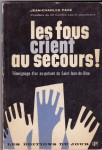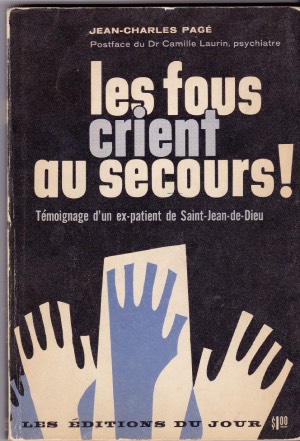
 Jean-Charles Pagé, Les fous crient au secours, Éditions du jour, 1961.
Jean-Charles Pagé, Les fous crient au secours, Éditions du jour, 1961.
In 1961 a few short weeks after Montreal had hosted the Third World Congress of Psychiatry, the Éditions du Jour brought together journalists from the city’s major dailies to announce the publication of a book the title of which was as graphic as deliberately provoking: Les fous crient au secours ! (Help! Cry the Lunatics). Its author, Jean-Charles Pagé, retraced in it the abysmal conditions of his internment in the Hospital Saint-Jean-de-Dieu, Quebec’s largest psychiatric centre, situated in the East of the Island of Montreal. The witness account from this former alcohol addict was bolstered with a postface by an ambitious young psychiatrist, Dr Camille Laurin, who was at the time in charge of the department of psychiatry at the University of Montreal and the scientific director of the Institut Albert-Prévost. Nothing short of a manifesto, this postface called for a wholesale reform of the mental health care system in the Canadian province.
To make sure the publication had the desired impact, Camille Laurin, who had battled for the modernisation of Quebec psychiatry since his return from Paris in 1957, met the city’s main media, trade unions and religious leaders during the previous weeks. He couldn’t have been more pleased with the reception given to the book, which, the following day, made the front page of Quebec’s major dailies. Whereupon a major debate opened around the care formulae required for the Province’s mental patients. The polemic grew so fast that the freshly elected Liberal provincial administration had to intervene.
Only a few weeks after the publication of Pagé’s book, a fact-finding board was set up chaired by psychiatrist Dominique Bérard and tasked with the assessment of the main psychiatric institutions in the Province. Six month later, on 6 March 1962, the Board handed over its conclusions to the Health Minister. The “Bérard Report” returned a sorry account of the mental health care system and advocated its root and branch reform on the model found in Laurin’s postface from which it drew extensively. It had a simple mantra: increase state funding for psychiatric hospitals, train a larger number of psychiatrists but above all bring in a policy of psychiatric de-institutionalization in order to exit the broadly asylum-centred model in place. In order to fulfill this mission, Jean Lesage, created within the health ministry a mental health services unit which he entrusted to the Board members, tasked with the implementation of their own recommendations. Thus began what would come to be known, in an echo to the social modernisation then experienced in Quebec, as psychiatry’s own “Quiet Revolution”.
For all that the effective outcomes of de-institutionalization were rather low-key on the long term, Quebec psychiatry, notably its French-speaking element, no less went through a golden age. Indeed, the number of psychiatrists grew in short order benefitting from a wholly reconfigured formation, and actively funded research. More importantly, subsequent to government reforms or boards of enquiry, psychiatrists were entrusted with the management of the Province’s main mental health care centres, which had hitherto been controlled by religious congregations. The profession was finally acknowledged as a medical specialism in its own right, fully in charge of its dedicated realm. As for Jean-Charles Pagé, he went off the media radars after the 1961 publication, still by the Éditions du Jour, of a book titled Comment je suis devenu alcoolique which went broadly unnoticed in spite of a preface by Camille Laurin. He resurfaced in 1980 when former patients of Dr Ewen Cameron took the CIA to court for the experiments they had been subjected to at McGill University, in the framework of Project MK-Ultra.
In the event, early research on the history of Quebec’s contemporary psychiatry, which came out at the same time, seized upon the book to make it the trigger of Quebec psychiatry’s entry into modernity. Today, Les fous crient au secours ! remains a requisite reference in the history of Quebec psychiatry – additionally vested with powerful symbolism as shown by the recent reprint commissioned by community activists defending the rights of psychiatrized people.
Read more in the dictionary : Radicalisation and psychiatry - Female delirium - The suitcases of Willard State Hospital
Read the paper in French : Révolution tranquille
Références :
Dominique Bédard, Denis Lazure et Charles A. Roberts, « Une révolution tranquille au Québec au chapitre de la psychiatrie », Laval médical, vol. 35, n° 9, 1964, p. 1042-1050.
Alexandre Klein, « Préparer la révolution psychiatrique depuis Paris. Camille Laurin et l’histoire médicale française au service de la réforme du système québécois de santé mentale », Revue d’histoire de l’Amérique française, 71 (3-4), 2018, p. 87-110.
To quote this paper : Alexandre Klein, "Quiet revolution” in Hervé Guillemain (ed.), DicoPolHiS, Le Mans Université, 2023.